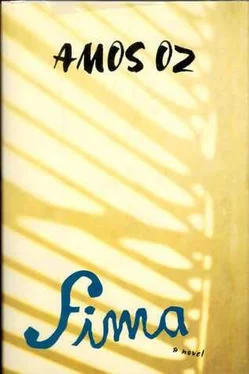Fima refolded the truncated letter and replaced it in its envelope, then put the envelope back in the folder from die Ministry of the Interior, Department of Local Government. He replaced the folder in the bottom drawer. It was after half past three. A cock was crowing far away, a dog was barking persistently in the dark, and the blind man was still tapping with his stick in the empty street. After a moment he thought he heard the muezzin calling in the village of Beit Safafa. He got back into bed, switched out the light, and started composing in his mind the missing ending. After a moment he fell asleep. He had had a long day.
IN HIS DREAM URI APPEARED IN THE MIDDLE OF A SNOWSTORM TO summon him to take his leave of Annette, who was dying of a complication of childbirth in a British naval hospital. They made their way on a sledge through a white forest until they reached a building that vaguely resembled the Monastery of the Cross in Jerusalem. Wounded and dying people with crushed limbs blocked their way, rolling on the floor in the corridors, groaning, bleeding. Uri said, They're only Cossacks; you can step on them. Eventually behind the monastery they discovered a pleasant little garden containing a Greek tavern with a vine-shaded terrace and tables set for a meal. Among the tables stood a sort of litter. When Fima parted the velvet curtains, he saw his wife making love tearfully but eagerly with a dark, shriveled man who was lying underneath her uttering feeble moans. Suddenly, in a flash of horror, it dawned on him that she was copulating with a corpse. The corpse was the Arab youth from the news bulletin, the one we murdered in Gaza with a bullet through the head.
20. FIMA IS LOST IN THE FOREST
AFTER WRITING IN HIS NOTEBOOK HE DOZED TILL SEVEN O'CLOCK. Rumpled, disheveled, hating his body's night smell, he forced himself to get up. He skipped the exercises in front of the mirror. He shaved without cutting himself. He drank two cups of coffee. The very thought of bread and jam or yogurt gave him heartburn. He vaguely remembered that he had to deal this morning with some matter that could not be put off, but for the life of him he could not remember what it was, or why it was so urgent. So he decided to go downstairs to his mailbox to fetch the letter he had seen in it last night, and also to bring up the newspaper, but not to spend more than a quarter of an hour on it. Then he would sit down at once to work uncompromisingly on the article he had not managed to finish in the night.
When he turned on the radio, he found that most of the news was over. Some bright spots were expected during the day. Along the coastal plain there was a possibility of scattered showers, whereas in the northern valleys there was still a serious risk of frost. Drivers were warned of the danger of skidding on wet roads and were asked to reduce their speed and avoid braking abruptly or turning too sharply.
What's the matter with them, Fima grumbled. Why can't they leave me alone? What do they take me for? A driver? A farmer from the northern valleys? A swimmer on the coastal plain? Why arc we asked and warned, when somebody ought to assume the responsibility and say, I ask, I warn. It's sheer madness: everything is falling span in this country, and they arc worried about a frost. In fact, applying the brakes abruptly plus a very sharp turn might just save us from disaster. But even that is doubtful.
Fima turned off the radio and called Annette Tadmor: he owed her an apology for his behavior. At the very least he should show some interest in her welfare. For all he knew, her husband might have had enough of his Italian operetta and returned sheepishly in the middle of the night, lugging a couple of suitcases, falling to the ground and kissing her feet. Was it possible that she had confessed to him what had happened? Was the husband liable to show up here with a loaded pistol? Out of habit or morning vagueness, Fima dialed Tsvi Kropotkin's number by mistake. Tsvi chuckled and said that although he was actually in the middle of shaving he had already asked himself what had become of Fima this morning: had he forgotten us? Tsvi's sarcasm eluded Fima.
"What do you mean, Tsvika? Of course I haven't forgotten you. I never would. I just thought for a change I shouldn't call you too early. You see, little by little I'm improving. There may be some hope for me yet."
Tsvi promised to call back in five minutes, as soon as he had finished shaving.
After half an hour Fima swallowed his pride and called Tsvi again:
"Well? So who's forgotten whom? Can you spare me a couple of minutes?" And without waiting for an answer he said that he needed some advice about an article he'd started writing in the night, and now this morning he wasn't certain he still agreed with himself. The question was this. Two days ago in Ha'arets there was a report of a speech by Günter Grass to a student audience in Berlin. It was a courageous, decent speech. Grass had denounced the Nazi period and gone on to denounce all trendy parallels between the atrocities of our own day and Rider's crimes, including the often-heard comparison with Israel and South Africa. So far so good.
"Fima," said Tsvi, "I read it. We talked about it the day before yesterday. Get to the point. Explain your problem."
"I'm just coming to it," said Fima. "But first, just explain one thing to me, Tsvika. Why does this Grass insist on referring to the Nazis as 'they,' whereas you and I, all these years, whenever we write about the occupation, the corruption of values, the oppression in the Territories, even about the Lebanon War, always and without exception use the pronoun Ve'? And Grass was actually a soldier with the Wehrmacht! The same as the other one, Heinrich Boll. He wore the swastika and had to give the Nazi salute every morning and shout 'Heil Hitler' with the rest of them. And now he calls them 'them.' Whereas I, who have never set foot in Lebanon, who have never served in the Territories, so that my conscience is clearer than Günter Grass's, regularly say and write 'we.' 'Our wrongdoings.' And even 'the innocent blood we have shed.' What is it, that 'we'? Something left over from the War of Independence: We are always at the ready, we are here, we're the Palmach? Who is this 'we,' anyway? Me and Rabbi Levinger? You and Rabbi Kahane? What does it mean, exactly? Have you ever thought about it, Professor? Perhaps the time has come when you and I and all of us should follow the example of Grass and Böll. Maybe we should all start saying, exclusively, consciously, and emphatically: 'they.' What do you think?"
"Look," Tsvi said wearily, "the thing is with them it's all in the past, whereas with us it's still going on, and that's why."
"Are you out of your mind?" Fima cut in with an explosion of rage. "Can you hear what you're saying? What d'you mean, with them it's in the past, whereas with us it's still going on? What the hell do you mean by 'it'? What precisely is it according to you that is over and done with in Berlin but still goes on in Jerusalem? Have you gone crazy, Professor? What you're doing is putting them and us on the same level! Worse still, you're implying that the Germans have a moral advantage over us, because they've finished and poor old us, we're still at it. Who do you think you are? George Steiner? Radio Damascus? That's exactly the tainted comparison that even Grass, the graduate of the Wehrmacht, decries and calls demagoguery!"
Fima's passion was spent. In its place came sadness. And he said in the tone one uses to speak to a child who has hurt himself with a screwdriver because he has obstinately refused to take heed of the grownups' warnings:
"You can see for yourself, Tsvika, how easy it is to fall into the trap. Look what a fine line we have to tread."
Читать дальше












